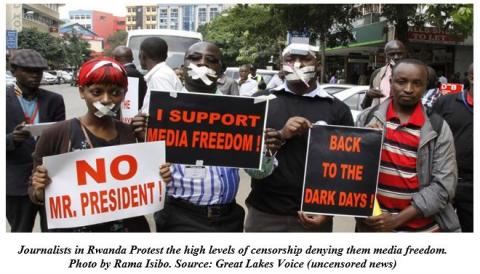THE SILENT STRUGGLE AGAINST MEDIA CENSORSHIP IN RWANDA
 Submitted by jbimokola on
Submitted by jbimokola on

For a full multimedia story visit https://sandykaybarublog.wordpress.com/
High levels censorship is one of the challenges that have negatively impacted on press freedom in Rwanda, making it almost impossible for journalists to report on certain issues transparently, without fear of possible future consequences. Censorship of online content and websites is still reoccurring, as the Rwandan government has put in place restrictions on the types of online content that citizens of the country can access and consume, particularly content that publishes negative information against the government.
According to Freedom House, numerous independent news outlets and opposition blogs were blocked in 2017 while some of them remained inaccessible for several months. The victimized websites included Inyenyeri News, The Rwandan, and Le Prophete. A number of independent online media outlets are currently still blocked since August towards the 2017 presidential elections.
“There is no transparency behind the government’s blocking decisions and no avenue for appeal,” Freedom House reported on their website. https://freedomhouse.org/report/freedom-net/2017/rwanda
However, all the international news outlets and websites have always remained unblocked even when they publish content about Rwanda that does not align with the government’s narrative and this is likely because most Rwandans engage with content in the local language, Kinyarwanda instead of English. These websites include the BBC, The Guardian, The New York Times, and Wikipedia.
In the recently concluded 2018 ranking of the World Press Freedom globally, Rwanda was ranked at as low as 156 on the world map by Reporters without Borders. This Index research was carried out of 180 countries across the globe, with the country ranking at number 1 as the best and the one at 180 as the worst in terms of press freedom. However, fortunately Rwanda’s ranking has slightly gone up by at least 3 points since 2017.
But Reporters Without Borders still warns there is a lot to be desired.
“President Kagame’s re-election in August 2017, which he won after carrying out a constitutional amendment allowed him to run for a third term, simply means that authoritarianism and censorship are likely to continue for the foreseeable future,” according to Reporters Without Borders. https://rsf.org/en/rwanda
This censorship has vividly caused press freedoms in Rwanda to continue deteriorating over the past few years. Till now, it has become a norm for the independent journalists in the country to frequently be subjected to harassment, death threats and abrupt arrests. Over time, most of the candid, blunt and outspoken journalists in Rwanda have either fled abroad or have gradually been forced to learn the aspect of censoring themselves. A number of journalists have been arrested and prosecuted under Rwanda’s media laws over the past few years, according to Freedom House.
Stanley Gatera, the editor of an independent news website Umusingi, was arrested and found criminally liable for a controversial opinion piece he published in June 2012, for which he was fined and sentenced to one year in prison for gender discrimination and inciting divisionism.
“Journalism is a still a tight profession in Rwanda and at this particular point it takes a tough cookie to continue practicing it for several years, one really has to want it so bad that creating a positive impact is their sole goal,” Maggie Mutesi, a business journalist at Rwanda TV said.
She adds that although it should also be publically acknowledged that a lot of great strides have been made to better the situation, unfortunately there are still so many challenges still prevailing.
The Constitution of Rwanda entails Freedom of the press in Article 34, where this principle is recognized and guaranteed by the State. But it also states that freedom of speech and freedom of information shall not prejudice public order and good morals, the right of every citizen to honor, good reputation and the privacy of personal and family life.
Henry Maina, the Chief Executive Officer at Article 19 East Africa, says that to a large extent, the law protects journalists but there are still serious limitations like criminal defamation, sedition, publication of genocide-denial and publication of alleged “false news” that are hostile to media freedom.
“Journalists who seek to write stories on alleged corruption and succession political contests within the ruling party suffer more,” Maina said.
Even with a newly established Media Law already in place, that was signed and implemented in 2010, censorship and self-censorship are still very universal and inescapable in Rwanda. In 2015, the government of Rwanda banned BBC radio broadcasting in the local Kinyarwanda language because of showcasing a TV documentary questioning the official accounts of the 1994 genocide.
“Rwanda has a unique past, where one million people were killed in 100 days of the genocide against the Tutsi, and media was blamed for fueling the killings. So these days the media regulators are very conscious of what the media reports,” said Athan Tashobya, a journalist at New Times Rwanda.
According to BBC News Africa, the documentary in question entitled “The Untold Story”, includes interviews with US-based researchers who say most of people that died may have been Hutus, murdered by members of the then-rebel Rwandan Patriotic Front (RPF), which has been in power since 1994 led by Paul Kagame, Rwanda’s current president.
In Rwanda today, self-censorship continues to flourish and it was also extremely evident while I worked on this story. Attenpts to contact several sources for interviews on press freedom in their country were futile. However, only three of them were willing to freely share this information as the rest were in fear of where the information was going to be published.
“Without a doubt Self-censorship truly exists in Rwanda but not for all journalists because some investigative journalists have reported on stories that have turned down the tables and held power to account; but there is certainly need for improvement as the economy grows,” Tashobya said.
- Log in to post comments
- 1411 reads
